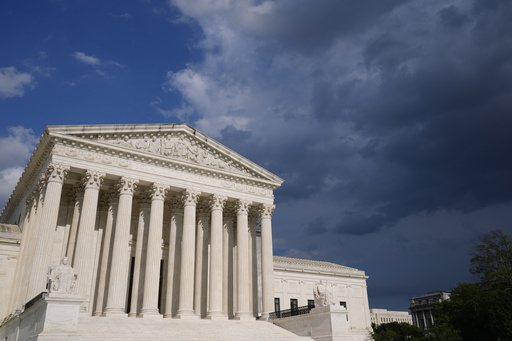
WASHINGTON — The Supreme Court currently holds a robust conservative majority, a significant outcome of Donald Trump’s presidency. If Trump is reelected, the conservative influence on the court may continue for decades to come.
The oldest justices, Clarence Thomas and Samuel Alito, are both in their mid-70s and may contemplate retirement, especially if it means their seats would be filled by younger nominees proposed by Trump, who is affiliated with the Republican Party.
South Carolina Senator Lindsey Graham, a key Republican figure, noted on social media that with Trump back in the White House alongside a Republican-controlled Senate, it could lead to a long-term conservative presence on the Supreme Court.
Christina Harvey, executive director of the progressive group Stand Up America, expressed concern. She emphasized that the crucial aspect is to prevent Trump from regaining power as it could entrench conservative dominance on the court for a substantial period.
Interestingly, the Supreme Court’s profile has been somewhat muted compared to its previous presence in presidential elections. Despite significant rulings in recent years concerning presidential immunity, abortion rights, guns, affirmative action, and environmental laws, these issues haven’t taken the forefront in political discourse.
Both Trump and President Joe Biden have strategically highlighted potential Supreme Court appointments to rally crucial voter blocs during their campaigns. In 2016, Trump leveraged lists of possible nominees to appeal to social conservatives, while in 2020, Biden made a commitment to appoint the first Black woman to the court, fulfilling that promise with Justice Ketanji Brown Jackson’s nomination in 2022.
Trump’s appointments, which include Justices Amy Coney Barrett, Neil Gorsuch, and Brett Kavanaugh, have established a solid conservative majority that resulted in the overturning of Roe v. Wade in 2022. This pivotal ruling has triggered bans and restrictions in several Republican-dominated states but has also sparked voter discontent, contributing to unexpected Democratic victories in the midterms and framing abortion access as a key issue on ballots across ten states in the current election cycle.
Vice President Kamala Harris, who represents her party in the presidential race, has emphasized reproductive rights in her campaign, although the Supreme Court itself does not receive similar attention. While she endorses some of Biden’s proposals for reforming the court, including implementing 18-year terms for justices and introducing a binding ethics code, she has not extensively discussed these initiatives in her campaign speeches.
Political science professor Alex Badas noted that messaging around abortion is straightforward compared to discussions about the court, which can seem abstract and difficult to engage with. Additionally, Badas pointed out that Trump feels secure with his conservative court and does not need to promote it as an election issue, while Harris is cautious about making commitments that could face hurdles after taking office.
The Supreme Court’s ideological balance is unlikely to shift even if the eldest liberal justice, Sonia Sotomayor, were to retire, as her replacement would not significantly alter the current dynamics.
Typically, presidential campaigns prioritize pressing issues such as national security, the economy, and foreign affairs rather than centering on the Supreme Court.
However, the political landscape shifted dramatically in 2016 when Justice Antonin Scalia’s unexpected death added urgency to the Supreme Court discussion, particularly when the Republican-controlled Senate declined to act on President Barack Obama’s nominee, Merrick Garland. This moment created a significant opening in a previously divided court.
Christopher Schmidt, co-director of the Supreme Court institute at the Chicago-Kent College of Law, noted that this situation was reminiscent of 1968 when Richard Nixon campaigned on a law-and-order platform that targeted the liberal Warren Court, knowing that the next president would appoint a successor to Chief Justice Earl Warren.
Biden’s promise to appoint a Black woman to the Supreme Court parallels Ronald Reagan’s campaign vow to appoint the first female justice, which was fulfilled shortly after he took office with the appointment of Sandra Day O’Connor.
